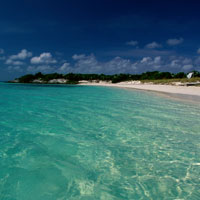Largely untouched by international commercialism, The Turks and Caicos Islands are a paradisical mini-archipelago in the Caribbean, consisting of two primary groups consisting of 30 islands in total.
Discovered by European explorers in 1512 they were largely unsettled by colonists until the 18th century, when they became popular pirate hideouts. In 1841, nearly 200 slaves escaped from the wrecked Spanish ship Trouvadore and became resident on the island, and many of today’s populace are direct descendants. Under British administration for centuries, they became a crown colony in 1962 and have been self-governing since 1973.
Like most Caribbean islands, there are plentiful beaches and with white sands and shimmering blue ocean; unlike most Caribbean islands, they are almost deserted and if you explore in greater depth you’re more likely to encounter wild donkeys than other people. The climate is perfect for relaxing, while the still, warm water is just as inviting for divers. On land, many of the ramshackle settlements look like they may still be pirate towns and the simple outlook of the residents is one of the archipelago’s many charms.
Since the decline of the salt mining industry in the 1960s, the Turks & Caicos islands have relied economically more and more on tourism. Little agriculture or manufacturing occurs, though there is a fairly extensive fishing industry, and much has to be imported. From the 1980s efforts were made to attract offshore investment and the international finance industry also has a major presence there. There have, however, been allegations of corruption any money laundering and in 2009 the island was placed temporarily back under British administration amid allegations of misrule.
Getting there
There are three international airports; most flights go to Providenciales, but Grand Turk and South Caicos also serve a number of routes. Flights to other Caribbean islands are limited however; many regional flights go via Florida.
Getting around
Public transport is limited. Buses and boats serve some routes but to explore the larger islands taxis are the only option; be sure to negotiate as they are unmetered. Car rental is cost effective for longer stays.
Local information
Language: English
Time: UTC-5
Climate: Tropical. Hot with moderate rainfall throughout year. Temperature: Max 33°C (August), Min 21°C (January). Rainfall: Max 110mm (November), Min 25mm (March)
Currency: United States dollar (USD)
Business etiquette: The business environment is generally relaxed; suits should be worn only on formal occasions. Otherwise, etiquette is similar to the UK.
Tipping: 15 percent for any waiters, bartenders, hotel maids, porters and taxi drivers.
Duty free: 200 cigarettes or 50 cigars or 125g tobacco; 1l of spirits or 2l of wine or perfume for personal use.
Safety: The crime rate is generally low. In Providenciales opportunistic theft is a risk and there have been incidents of armed robbery, with injury inflicted where the victim resists.
Laws: Possession of even small amounts of soft drugs attract severe penalties.
Healthcare: Vaccinations required for diphtheria, hepatitis A and tetanus. There is a reciprocal health agreement with the UK but private clinics are more prolific and better equipped. Health insurance is recommended for all nationals.
Socket type: Type A





